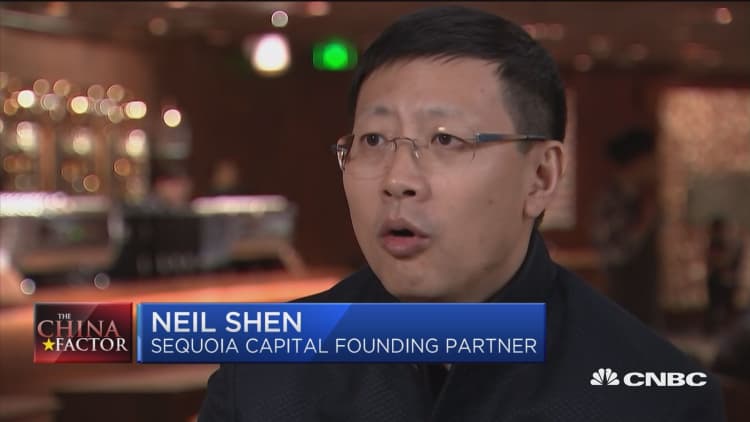Sequoia, the venture capital firm known for early bets on everything from Apple and Google to WhatsApp and Dropbox, is setting a high bar to get into its upcoming global growth fund: $250 million.
That's the minimum check size required for limited partners to participate in the fund, which is aiming to raise up to $8 billion, said sources familiar with the matter who asked not to be named because the fundraising is confidential. Sources told CNBC that amount is three to four times bigger than what top funds typically get from their biggest limited partners.
Sequoia, long considered the gold standard among venture firms, is holding its annual meeting for existing investors in Beijing in mid-April, sources said, as China becomes a bigger emphasis. The event is typically held in San Francisco, though the firm has held one previous meeting in Beijing.
Sequoia is targeting the end of the second quarter to close both the global growth fund and a half-dozen smaller funds, the sources said. In total, Sequoia is in the process of raising up to $12 billion for the global growth fund, as well as multiple funds in the U.S. and China (growth and venture) and one in India. The Wall Street Journal reported on the numerous funds earlier this month, including the effort to raise $8 billion for the growth fund.
The multi-tiered strategy will give Sequoia the flexibility to keep making early-stage bets while also writing mammoth checks at a time when start-up investing is all over the map, in terms of geography and the size of rounds.
Sequoia's last global growth fund in 2015 reeled in $2 billion. That's a big fund by Silicon Valley standards, but it's dwarfed by the $100 billion Vision Fund that SoftBank rolled out last year. SoftBank has already invested over $7 billion in Uber, mostly buying stock from existing shareholders, and has put hundreds of millions of dollars into dog-walking start-up Wag and food delivery provider DoorDash, an early Sequoia investment. Internationally, the fund has taken big stakes in Indian e-commerce giant Flipkart and German online car dealer Auto1.
"SoftBank has shown they are not particularly valuation sensitive and will pay premium valuations," said Anand Sanwal, CEO of CB Insights, which tracks and analyzes the private markets. "Given this new reality, Sequoia's mega-fund helps them compete in those deals if they so choose."
SoftBank's cash hoard is a welcome sight for many entrepreneurs who could use the extended runway before deciding if they want to sell or go public. But it's also generating concern that too many start-ups will accept terms that create challenges down the road, whether in the form of excessive debt payments or handing over too much equity and company control.
With a 45-year history of investing in some of Silicon Valley's biggest successes, Sequoia is known to be more founder friendly than non-traditional start-up investors and can use its sizable war chest to lure entrepreneurs who prefer to steer clear of SoftBank, sources said. More broadly, it gives Sequoia a bigger pool of capital to do later-stage deals as companies stay private longer.
The global growth fund, Sequoia's third, will have a five-year investment horizon, two years longer than the investment period for the prior to funds.
China's growing tech scene
Sequoia is poised to notch a big win this week when Dropbox debuts on the Nasdaq. Sequoia led the software company's seed round in 2007 and currently owns $1.5 billion worth of its stock, based on the middle of the expected price range. That number could swing wildly once Dropbox starts trading and, as an insider, Sequoia is forbidden from selling any shares for six months.
While Dropbox follows a long string of U.S. hits, Sequoia has become an equally powerful force in China, backing logistics company ZTO Express, drone-maker DJI and bike-sharing start-up Mobike. The China team is led by Neil Shen, who's worth over $1 billion according to Forbes. Unlike in the U.S., where multiple Sequoia partners call the shots, one source said Shen is the "whole shebang" in China, with a big team working for him.

In December, Shen spoke with CNBC's Andrew Ross Sorkin about the Chinese tech landscape and the start-up opportunity there.
"Oftentimes people still think China is about low-tech, China is about copying from the West," Shen said. "Things have really changed especially in the past five years. There are business models originated from China."


